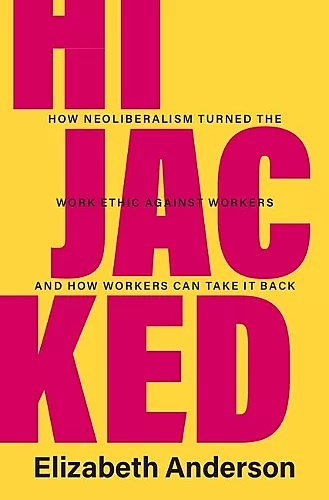Hijacked
How Neoliberalism Turned the Work Ethic against Workers and How Workers Can Take It Back
Format:Hardback
Publisher:Cambridge University Press
Published:21st Sep '23
Should be back in stock very soon
This hardback is available in another edition too:
- Paperback£18.99(9781009275392)

Shows how the work ethic has been used to oppress workers, and also to liberate them.
This sweeping history of classical economics shows how the work ethic has been used both to oppress workers and to liberate them. Today's neoliberalism offers an oppressive version of the work ethic. However, the work ethic also offers resources for reorganizing the economy on behalf of ordinary people.What is the work ethic? Does it justify policies that promote the wealth and power of the One Percent at workers' expense? Or does it advance policies that promote workers' dignity and standing? Hijacked explores how the history of political economy has been a contest between these two ideas about whom the work ethic is supposed to serve. Today's neoliberal ideology deploys the work ethic on behalf of the One Percent. However, workers and their advocates have long used the work ethic on behalf of ordinary people. By exposing the ideological roots of contemporary neoliberalism as a perversion of the seventeenth-century Protestant work ethic, Elizabeth Anderson shows how we can reclaim the original goals of the work ethic, and uplift ourselves again. Hijacked persuasively and powerfully demonstrates how ideas inspired by the work ethic informed debates among leading political economists of the past, and how these ideas can help us today.
'Hijacked is an important and fascinating book that tells the spellbinding story of the struggle between conservatives and progressives over the Protestant work ethic. Nobody matches Anderson's distinctive combination of historical, political, and philosophical insight.' Stephen Darwall, author of Modern Moral Philosophy: From Grotius to Kant
'This critical examination of the Protestant work ethic and its evolution in social and economic theory outlines the challenges of preserving rewarding and purposeful work in liberal economies where free market capitalism has eroded both aspirations and capabilities, undermining the intrinsic dignity and meaning of work.' Richard Donkin, author of The History of Work
'Most of us will spend a significant part of our lives at work. But work conditions differ radically and the working poor often face brutal and dehumanizing workplaces. In this brilliant book, Anderson uncovers the role of a skewed version of the work ethic in shaping these harsh conditions. This skewed version turned the values of industry, prudence, and frugality against workers, while leaving the predatory and idle rich off the hook. Not only does Anderson offer a subtle diagnosis of the origins of today's stigmatization and deprivation of the poor, but she offers creative ideas for reclaiming the work ethic in the service of democracy. Her superb analysis, connecting political philosophy with both history and political economy, will stimulate wide debate.' Debra Satz, coauthor of Economic Analysis, Moral Philosophy, and Public Policy
'As rigorous as it is approachable, this poignant plea for worker dignity contextualizes one of today's most salient economic issues.' Publishers Weekly
'If we arm ourselves with Elizabeth Anderson's superb history of the work ethic, we obtain a powerful lens with which to explore at a perfect time - during party conference season - how different visions of work form the beating heart of ideological struggle.' Morning Star
'Hijacked is a substantial achievement - scholarly, rigorous, and rich in detail, with the author's learning evident on every page.' Helen Hester, Los Angeles Review of Books
'… compelling reading for everyone on the left and the right who needs employment in a paid job to survive, so today's neoliberal conservative work ethic no longer gaslights us to believe our dignity demands our exploitation.' Tim Gurner, LSE Review of Books
'Hijacked is compelling reading for everyone on the left and the right who needs employment in a paid job to survive, so today's neoliberal conservative work ethic no longer gaslights us to believe our dignity demands our exploitation.' Magdalene D'Silva, LSE Review of Books
'A lively, informative, clearly-written, and highly relevant history and examination of the work ethic … I highly recommend it, not merely to those with a special interest in the work ethic, but to researchers in many other fields along with as many members of the wider public as possible.' C. E. Emmer, Philosophy of Management
ISBN: 9781009275439
Dimensions: 235mm x 160mm x 26mm
Weight: 700g
384 pages